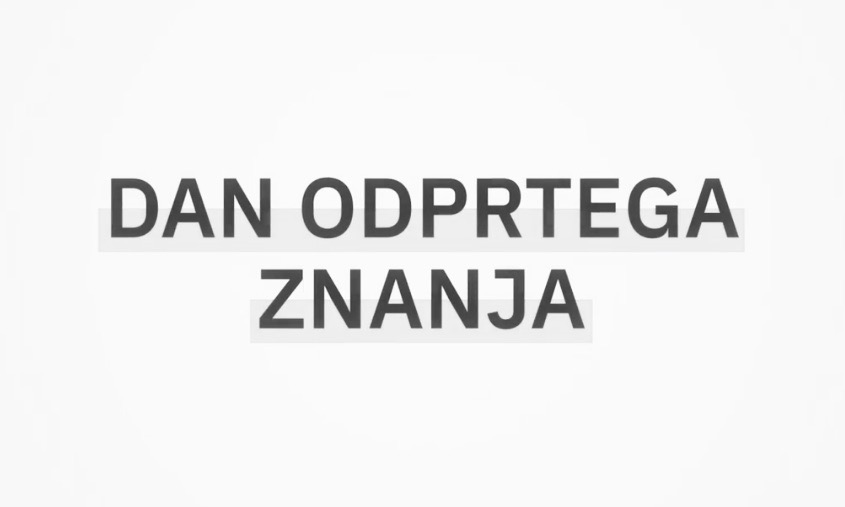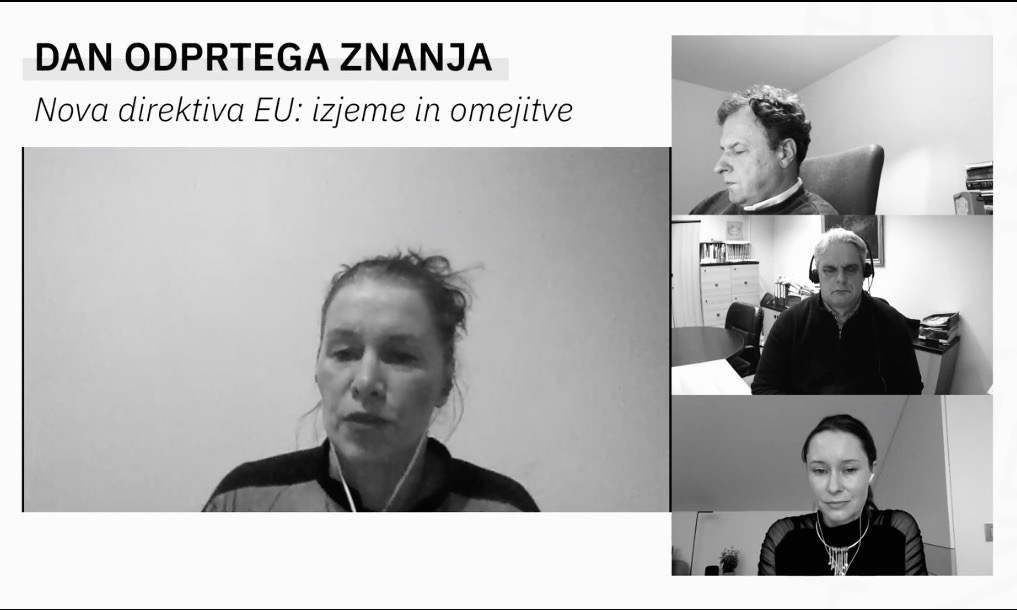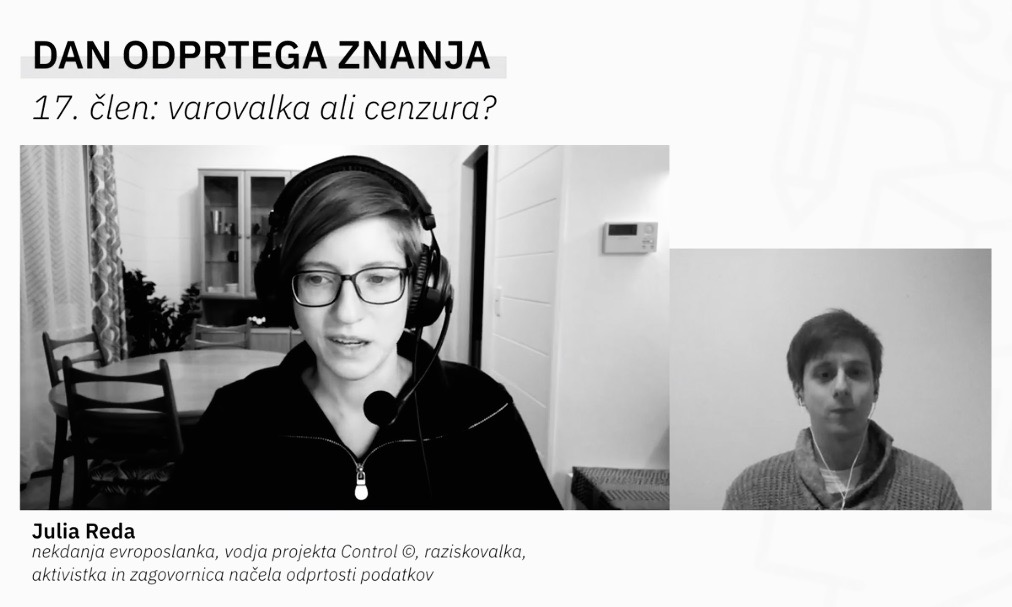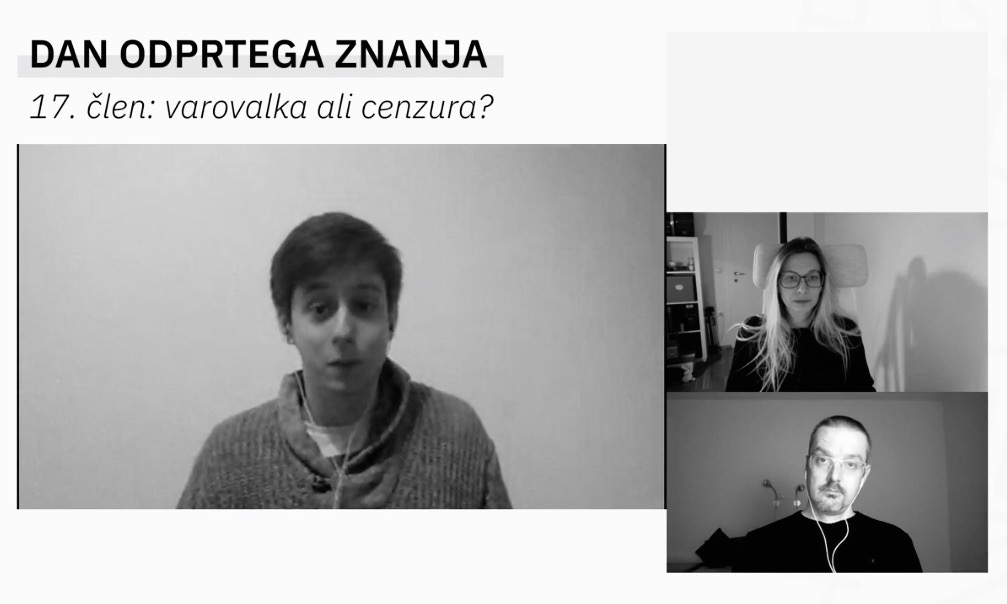Open Knowledge Day 2021 Report
On Wednesday, 20 January 2021, Intellectual Property Institute and Today is the new day institute have, in cooperation with the Aksioma institute and Creative Commons, organised the Open Knowledge Day 2021 event, where we discussed the new EU Directive on copyright and related rights in the digital single market, exceptions and limitations for education, research libraries, and data analytics, and separately about the controversial Art 17, which imposes new obligation for online platforms.
This year’s Open Knowledge Day consisted of two parts, whereas the first part focused on the exceptions and limitations for education, research libraries, and data analytics, and the second part focused on the implementation of Art 17.
Part 1: Copyright exceptions and limitations in the DSM Directive for education, research libraries and data analytics
The first part of the event was moderated by dr. Maja Bogataj Jančič, she was joined by doc. dr. Katarina Krapež, University of Primorska, mag. Miro Pušnik, CTK and Marko Grobelnik, Jožef Stefan Institute who all presented their opinions.
First one to speak was doc. dr. Katarina Krapež, who presented the exception for education, and firstly pointed out that even though such topics are a part of a workday for pedagogues, they are not getting the public attention they deserve. She presented her opinions from the position of an educator who seeks to transfer knowledge, and first emphasized that she advocates for the broad implementation of the exception from Art 5 DSM Directive, which would allow pedagogues to use works for illustration for teaching and non-commercial purposes. Even though Art 5 of the DSM Directive refers to digital and cross-border teaching, she expressed the wish that education in person will also be properly considered in the implementation process in Slovenia. She emphasized that, in the light of her practical experience, a good benchmark for how much of copyrighted works should be allowed to be used under the exception is to consider the purpose of illustration for teaching, since copyrighted works are usually used only to a limited extent in teaching. She advocates for a better definition of a “secure electronic environment”, which would also lay the foundations for further regulation. For the proper implementation of the exception, she proposed that the rules regulating secure electronic environments should be logically applied to a purely classical lecture room as well, which is especially important for the distribution of works in physical form. She further proposed that the exception also includes other subjects that provide education but are not as such a part of the education sector, as well as various informal platforms (eg. online courses).
In this part of the event, it was especially pointed out that there is a big gap between legislation and practice in the field of education, and that there is a gap between the declaration of advocacy for open education at the Ministry of Education, Science and Sport (MIZŠ) and what is actually done in the field of copyright. An example of this is the MP question, which was raised at the session of the Slovenian Parliament on 14 December 2020 that urges the appropriate copyright regulation of distance learning, to which there has been no response at all.
Second to speak was mag. Miro Pušnik, who focused mainly on the provisions of the DSM Directive relating to research libraries. He started by stating that most research work takes place in a digital environment and mentioned that scientific work is evaluated quantitatively, which means that researchers must resort to publishing in scientific journals that usually charge license fees, which presents a serious limitation for researchers and research libraries. Mr. Pušnik pointed out how important it is, in the implementation process of the DSM Directive (especially Arts 3, 5, 6, 7, 8-11) into the Slovenian legislation, to take into account the views of libraries and other research institutions, which primarily want the exceptions to be regulated within a reasonable time, in order to ensure researchers can continue their work smoothly. He emphasized that publishers should be prevented from using the contractual provisions to prevent the use of exceptions (Art 7), that the TDM exception for researchers (Art 3) should be harmonized with the principles of open science, that the definition of out-of-commerce works and the scope of the licensing mechanism or the method of granting authorization for the use of such works should be precise and clear (Articles 8-11), and lastly, that the transparent operation of collective management organisations should be ensured. Finally, he mentioned the formation of an “Open Science Community” in Slovenia, which will, among other things, provide information support to researchers in open publications and the handling of research data.
The first part of the event was concluded by Mr. Marko Grobelnik, who spoke about the impact of copyright and new exceptions for data analytics on the development of artificial intelligence. He emphasized that researchers in the field of artificial intelligence want as few restrictions as possible, since their freedom is of great importance for creating innovations. He pointed out the inadequacy of the term “text and data mining” used by the DSM Directive, and explained that data and text analytics serve to aggregate and model data, which is important for dealing with unprecedented situations. In his opinion, the excessively restrictive implementation of exceptions in Slovenia would affect the competitiveness of companies and could lead to the flight of brains and ideas to other parts of the world, where there are no such restrictions. Finally, he explained that in the future, a shift from data to the field of knowledge is expected, as the primary market commodity will become knowledge obtained from data.
Part 2: Article 17 of the new directive – safeguard or censorship?
The second part, moderated by Filip Dobranić, Today is a New Day, included guests Julia Reda, former German MEP and project manager of Control ©, Saša Krajnc, PhD candidate at the Faculty of Law, University of Vienna and Domen Savič, digital activist and authors’ representative. Unfortunately, Klemen Dvornik, President of FERA, President of ZDSFU and a member of the Supervisory Board of AIPA, who could present the views of collecting societies and rightsholders, canceled his participation at the last minute.
Julia Reda began by presenting the case of the Court of Justice of the European Union (CJEU) no. C-401/19, in which Poland requested the annulment of provisions of Art 17 of the DSM Directive that require mandatory use of upload content filters, since they violate users’ freedom of expression. The question whether upload content filters should be mandatory is problematic, since the InfoSoc Directive stipulates that EU Member States shall not impose a general obligation on providers to monitor the content uploaded by users (this is also set out in paragraph 8 of Art 17 DSM Directive). The European Parliament has made it clear that the use of upload filters should not be mandatory. However, the question of how the situation should be then regulated in practice remains open, as Art 17 DSM Directive also requires that online platforms should make best efforts to prevent infringement of the copyright of rightsholders. For the implementation of the DSM Directive in the Member States, this means that it should be explicitly stated that there should be no general obligation for providers to monitor uploaded content, and that Art 17 should be implemented in a technologically neutral way. The second question in the CJEU case concerned the impact on freedom of expression. Due to the speed of communication over the Internet, it is problematic for the freedom of expression if the content is firstly blocked and then re-published only after the user’s complaint has been finally resolved. In this regard, the European Parliament explained that automatic blocking of the uploaded content, which includes copyrighted work, would not be in line with the DSM Directive, since the latter explicitly states in Art 17(7) that there should be no prevention of the availability of works or other subject matter uploaded by users, which do not infringe copyright. This could be problematic, because automatic online platforms’ upload filters cannot distinguish between an infringing use of a copyright work and a legitimate use under one of the exceptions (eg. parody). In this regard, the European Commission and the European Parliament have clarified that, when weighing the obligation to prevent the copyright infringement and the obligation to keep content online, priority should be given to the obligation to keep content online. This means that Member States must introduce specific rules that will prevent legal content from being blocked automatically. Some Member States have tried to solve this problem by including parameters, which will distinguish “manifestly” infringing content from the legitimate content. In this regard, Julia is of the opinion that in case of doubt whether the content is legitimate or not, the content should remain online until the case is settled in a separate procedure.
Julia then discussed the various proposals for the implementation of the DSM Directive in the EU and explained that both the German and the Austrian proposals establish a presumption of legality of uploaded content. Both propositions include technical parameters that allow for distinction between “manifestly” infringing content and legitimate content, and both also include the possibility for users to preflag uploaded content as legitimate, which is very important in cases where the copyright works are used on the basis of licenses or permits. Further, she drew attention to the Finnish proposal, which states that platforms should use automatic content recognition technology, yet this technology should not be used to automatically decide whether to block the uploaded content or not in advance. Instead, the Finnish proposal requires for such technology to be used only to inform rightsholders that their works are used. Furthermore, users have the opportunity to explain why they think that the content is legitimate and that the copyright is not infringed. The rightsholder then decides if the uploaded content shall be removed, but is held liable for any unjustified removal of legitimate content. When asked about which of the implementation proposals is the most appropriate, she stressed that they all have their advantages and disadvantages, and particularly praised the Austrian proposition, which gives user organizations a chance to sue platforms that automatically block content on a large scale. In the end, Julija once again emphasized the importance of the safeguards mechanism, which enables the prevention of automatic blocking of uploaded content, and the importance of the human factor in deciding on possible copyright infringements.
The second part of the event continued with a presentation by Saša Krajnc, who first emphasized two principles on which Art 17 of the DSM Directive is based: providing compensation to rightsholders by online platforms or, if that is not the case, the obligation of online platforms to prevent publication of infringing content. She emphasized that it is necessary to respect copyright, yet at the same time, it is necessary to prevent interference in the legitimate use of copyrighted works (eg. on the basis of exceptions for citation, criticism, parody). Although the choice of method of implementing the DSM Directive is left to the Member States, Saša Krajnc is of the opinion that it will not be enough to simply directly copy the text of the Directive into their national laws, which is especially true for Slovenian legislator. She further pointed out how important it is for freedom of speech that uploads are not automatically blocked, as this would silence users. It is important that users are heard when important topics are relevant, and not only later on. She also spoke about the DSM Directive implementation process in Slovenia, where MGRT received the opinions of various stakeholders, but there has been response to them yet.
Last to speak was Domen Savič, who was critical of the Slovenian legislator mainly because this topic had not been appropriately discussed for two years, and we are, consequently, still at the starting point. For this reason, he emphasized the importance of the participation of all stakeholders in the implementation process, especially publishers. He expressed the need to draw attention to the situation of individuals, who are not part of different interest groups and for this reason do not have political representation in the dialogue. According to his opinion, a consequence of Art 17 is that users will no longer have “open internet” where they could create without limitations, since the platforms will gain enormous control. He further emphasized the importance of protecting users on a collective level, as they would otherwise be at a disadvantage, if they had to depend solely on themselves.
At the end of the event, Filip also invited to the Communia Salon on ex-ante user rights safeguards in Art 17 DSM Directive, which will take place on 26 January and will address topics similar to those discussed at the Open Knowledge Day 2021.
The Open Knowledge Day was held live via Facebook Live, a recording of the event is available here.
The event was also reported by Slovenian National Radio and TV organisation RTV.
A big thank you to all the participants and to all who joined in to listen to the event. See you again at the next Open Knowledge Day!
The Grand Board of the European Union Intellectual Property Office (EUIPO) finally ruled that the figurative sign ‘COVIDIOT’ cannot be registered as an EU trademark.
The 4th Open Knowledge Day took place on Tuesday 17 October 2023, with an accompanying workshop on 18 October 2023. This year it was organised by the Open Data and Intellectual Property Institute (ODIPI) and supported by Knowledge Rights 21 (KR21).
We invite you to the fourth Open Knowledge Day and the workshop, which will take place this year within the framework of the programme and with the support of Knowledge Rights 21. The event will bring together experts from different European countries to discuss two topics: the first part will deal with the legal basis for data analytics, which is a key part of machine learning and related artificial intelligence, and the general exception for research. In the second part, open science in theory and practice will be presented both in Slovenia and in some Western Balkan countries. Representatives of research and educational institutions from Slovenia and the Western Balkan countries, as well as interested members of the public, are invited to attend.
Dr. Maja Bogataj Jančič, a renowned expert in copyright law, has joined the Berkman Klein Center for Internet & Society at Harvard University, where she will serve as an affiliate researcher for the next two years.








